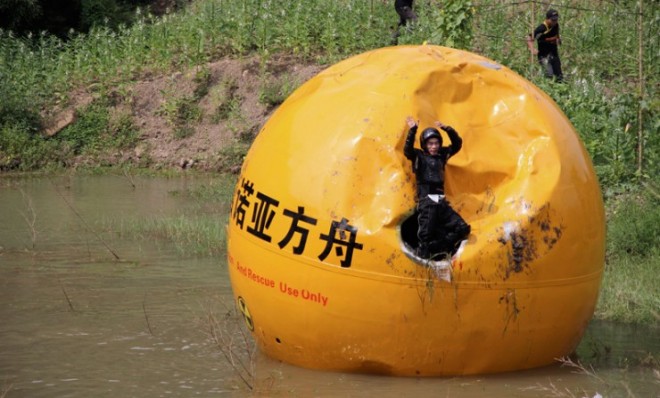6 crazy ways people around the world are prepping for 'doomsday'
The end is nigh... at least according to these overly prepared folks

A free daily email with the biggest news stories of the day – and the best features from TheWeek.com
You are now subscribed
Your newsletter sign-up was successful
Circle your calendars: The world ends on December 21... at least according to some out-there prognosticators. And predictably, more than a few rattled souls from different corners of the globe are rushing to empty their savings accounts and stockpile nonperishable food, guns, ammo, gas generators, and whatever other doomsday supplies they can get their hands on. Of course, the Mayan calendar predicting the end of times has probably been misread, and NASA insists there aren't any asteroids headed our way anytime soon. But the philosophy of these so-called "preppers" is that you can never, ever be too careful. Here's how they're getting ready for the end of the world:
1. The man building Noah's Ark
Lu Zhenghai of China is sinking $160,000 of his life savings into a massive ship to ensure that he and his family are protected in the event of a worldwide flood. The house-sized ship is pretty substantial, too. At 65 feet long, it weighs about 80 tons, built mostly of timber and steel. It's unclear if there will be any animals taken onboard.
The Week
Escape your echo chamber. Get the facts behind the news, plus analysis from multiple perspectives.

Sign up for The Week's Free Newsletters
From our morning news briefing to a weekly Good News Newsletter, get the best of The Week delivered directly to your inbox.
From our morning news briefing to a weekly Good News Newsletter, get the best of The Week delivered directly to your inbox.
2. The man who built a nuclear shelter out of school buses
Bruce Beach, a 78-year-old former high school teacher living in Ontario, is no stranger to fallout shelters. He built his first in response to the Cuban missile crisis in the '60s. His life's work, a sprawling underground labyrinth nicknamed "Ark Two," was finished in the 1980s and is comprised of 42 underground school buses. Beach rents out rooms in Ark Two, and like most B&Bs, Ark Two rooms boast a kitchen, shower, and separate bunks for children and adults. "People have been in a panic because someone has prophesized the end of the world this particular week or whatever," he told the Canadian Press. "They call us up just to make sure we have space in the shelter and I tell them, 'For sure, come on down.'"
3. The man building 3-ton steel balls
Not to be outdone by his ship-building countryman, 32-year-old Yang Zongfu of China has been building 3-ton yellow steel balls measuring 13 feet in diameter. The balls are hollow, and inside each there are seatbelts. They're designed to withstand a volcano, tsunami, earthquake, or nuclear meltdown. Yang calls each anti-disaster bubble "Atlantis."
A free daily email with the biggest news stories of the day – and the best features from TheWeek.com
4. The man who spent $130,000 on survival equipment
More than $130,000 of author Patrick Geryl's savings have gone into survival prep. In a small wooden bunker in South Africa (far away from the site of a potential nuclear meltdown), Geryl has stockpiled walls of guns, ammo, water purification tablets, and more should the world need to be re-colonized. All of this is detailed in his tell-all book, How to Survive 2012. But with only two-and-a-half stars on Amazon, it's safe to say it probably won't make any best-seller lists come 2013.
5. The man who spent $350,000 on survival equipment
$130,000 is nothing! Australian marketer Robert Bast, 46, is the proprietor of a community called Survive2012.com, and has spent upwards of $350,000 stockpiling food, water, gas cookers, generators, and a pick-up truck to take his wife and three children to a safe house 1,500 feet above sea level. "What is certain is that in my lifetime, there is a strong likelihood that there will be a catastrophe of some kind," he tells CNN. "The sun destroy power grids, a flu pandemic that kills millions, an asteroid blast or meteor or comet striking earth, or a magnetic pole shift."
6. The couple stockpiling honey bees
A New England mom named Kathy Harrison prefers her other nickname: The "Doris Day of Doom." But rather than stockpile weapons and ammunition, Harrison and her husband are keeping something a bit unorthodox: Honey bees. "In a grid down situation those bees become not just food for us, but they become money that we can barter for," said Harrison. "Those bees are the essence of resilience for us."